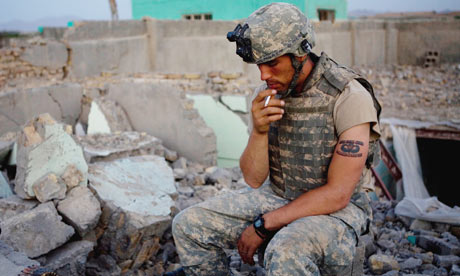
By Karen Finney - 03/19/12 06:14 PM ET
We may never know all of the factors that led an American soldier to allegedly murder 16 people in Afghanistan. The more we do learn, the more it seems there were signs of the toll that repeated deployments, an injury and the stress of his situation back home were taking. None of that excuses what the soldier reportedly did. However, given the number of Americans who have served or are serving in Iraq and Afghanistan who could be facing similar stressors, we have a responsibility to better understand and factor in these human costs in any conversations about the way forward — particularly for the benefit of the 40 percent of U.S. citizens who still believe the war is worth the costs.
There are a number of human costs that are rarely factored into conversations about war spending, including long-term care of our wounded or costs and lost income to their families who must now provide care. Or the costs associated with the unique challenges of coming home a changed person, the cumulative impact of combat, repeated deployments, stress on relationships, domestic violence or the long-term impact on generations of children. Or the costs of better evaluating the link between these stressors and injuries in order to prevent tragedy. Some suggest these stressors contribute to rates of death by suicide — a recent report by the Center for a New American Century estimates that one veteran dies by suicide every 80 minutes, representing 20 percent of suicides in the United States, and that between 2005 and 2010, a U.S. service member died by suicide every 36 hours.

Like President Obama’s decision to change the Bush-era practice of keeping the costs of Iraq and Afghanistan off-budget, including these human costs will have political consequences, as Americans get a more accurate picture of the war spending over the long term. The current estimate of $1.38 trillion in spending through fiscal 2012 — $807.4 billion to Iraq and $570.9 billion to Afghanistan — will increase dramatically. A 2010 study by the Eisenhower Research Project at Brown University’s Watson Institute for International Studies estimated that over the next 40 years, the total costs for medical care range from $600 billion to $1 trillion — not usually included in war cost analyses. Additionally, these costs traditionally peak 30 to 40 years after a conflict, requiring a long-term plan to meet those obligations.

As we talk about the immorality of passing debt onto our children, let’s also consider the immorality of failing to help the more than 2 million American children who’ve had a parent deploy to Iraq and Afghanistan. The National Center for Children in Poverty found that wartime deployments “can be one of the most stressful events of a child’s life.” Not surprisingly, children with parents deployed have higher rates of behavioral and emotional problems, sadness, depression and issues in school. The increased stress and responsibility for the parent who remains at home — financial issues, isolation, sadness — can also affect children.
Just as they need proper equipment such as body armor to fight the war, the men and women we send to war and their families need better tools to help them not only survive the deployments, but to better evaluate the impact of those deployments on them and their families and to help them reclaim their lives back home. Doing so requires a full accounting of those costs, which must be part of any campaign rhetoric or conversation about “finishing the job” in Afghanistan or attacking yet another country like Iran or Syria.

Karen Finney is a political analyst for MSNBC and Democratic consultant, and co-host of POTUS/Sirius XM’s “The Flaks.”

The other cost of war - TheHill.com
Connected Blog (least to me, as all is connected, some connections closer than others): http://politicalastrologyblog.com/
+++++++++++++++++++++++++++++
HELP-Matrix Humane-Liberation-Party Blog
http://help-matrix.blogspot.com/
Humane-Liberation-Party Portal
http://help-matrix.ning.com/
@Peta_de_Aztlan Blog
http://peta-de-aztlan.blogspot.com/
On Twitter @Peta_de_Aztlan
+++++++++++++++++++++++++++++


No comments:
Post a Comment
Please keep comments humane!